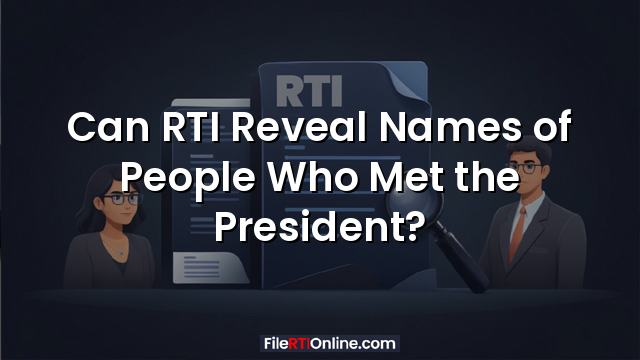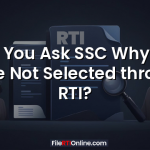A common RTI question is whether details of visitors who meet high constitutional authorities—like the President, Governor or Chief Minister—can be disclosed. Citizens often seek such information to understand patterns of influence, lobbying, or access.
But does the Right to Information Act allow disclosure of names of private individuals who met the President?
A recent decision of the Central Information Commission (CIC), based on an RTI regarding visitors from Maharashtra who met the President on certain dates, explains the legal boundaries.
Case Example: Request for Names of People Who Met the President
Background
An RTI applicant asked the President’s Secretariat for:
· Names of all persons from Maharashtra
· Who met the President of India
· On specific dates.
The PIO denied the information :
· Section 8(1)(e) – information held in a fiduciary relationship, and
· Section 8(1)(j) – personal information having no public interest and protected .
What the CIC Observed
The CIC made the following key findings:
1. Visitor details are personal information
If an individual meets the President privately or personally, the visit is:
· Not a public activity
· Not related to any public duty
· An interaction that can be private in nature.
Thus, such information falls squarely under Section 8(1)(j).
2. Private meetings do not create public records
The Secretariat is not required to disclose:
· Who met the President privately
· Why they met
· Nature of personal discussions.
These visits are not official meetings and do not relate to public functions.
3. Disclosure would invade privacy
Publishing visitor names may result in:
· Violation of personal privacy
· Misuse or speculation
· Unwarranted intrusion into private affairs.
Therefore, denial is justified.
4. Official meetings are different
The CIC made an important distinction:
· Official meetings: Minutes, names of officials, decisions taken – can be disclosed.
· Personal meetings: Names and details of private individuals – cannot be disclosed.
Only when the President meets people in an official capacity does the information become public.
CIC’s Decision
The Commission held:
· The PIO’s decision was correct.
· Disclosure would violate privacy under Section 8(1)(j).
· There is no larger public interest that requires disclosure.
· The appeal was rejected.
What This Means for RTI Applicants
You CAN ask for:
· Details of official meetings of the President
· Lists of official delegations, committees and government bodies
· Expenditure incurred on events, tours, or public functions
· Files or correspondence related to official decisions.
You CANNOT ask for:
· Names of individuals who met the President privately
· Personal visits or informal discussions
· Information about citizens’ personal matters
· Anything that amounts to snooping on private interactions.
Such information is protected to maintain privacy and dignity of individuals.
Key Principle Established
RTI promotes transparency in public functions, not private interactions.
When the President meets people in an official role, the details can be disclosed.
When the meeting is personal or private, the information is exempt.


